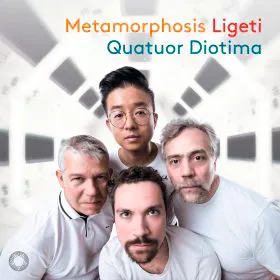
Ligeti Metamorphosis Ligeti – String Quartet No. 1, ‘Métamorphoses nocturnes’; String Quartet No. 2; Andante and Allegretto Quatuor Diotima Pentatone PTC 5187 061 53:54 mins
Though not extending to the late style of György Ligeti – a phase that opened with his only opera, Le Grand Macabre, but included no string quartets – this thrilling new release of the Transylvanian composer’s music for string quartet embraces three contrasting periods of his output. The earliest work, sensibly placed here between his String Quartets Nos 1 and 2 as a sort of palette cleanser, is the Andante and Allegretto for string quartet – written in 1950 when he was still under the influence of his teachers Ferenc Farkas and Zoltán Kodály – warmly played by the Quatuor Diotima.
But the real achievement lies elsewhere of course, in music that these players justifiably describe as ‘on the edge of utopia’. Dating from 1953-54, the String Quartet No. 1 (‘Métamorphoses nocturnes’) is the first work in which Ligeti’s own voice is truly heard, though its style and nocturnal atmosphere have led to it being nicknamed ‘Bartók’s 7th’. Opening with a quiet gathering up of sound, it is a work in which rapturous musing contrasts with virtuosic outbursts and fierce folksiness; these contrasts, not to say ruptures, are handled brilliantly by the Diotimas.
And then there’s the avant-garde classic that is the String Quartet No. 2, composed in 1968 after Ligeti had escaped communist Hungary. Its different soundworld, abstract and ephemeral, is encapsulated in the mesmerising middle movement’s ‘meccanismo di precisione’. These players, who have specialised in modern music since forming their ensemble at the Paris Conservatoire 27 years ago, are formidable throughout.
John Allison